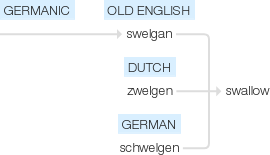Swallow
Old English swelgan, of Germanic origin; related to Dutch zwelgen and German schwelgen .
wiktionary
From Middle English swolowen, swolwen, swolȝen, swelwen, swelȝen, from Old English swelgan(“to swallow, incorporate, absorb, imbibe, devour”), from Proto-Germanic *swelganą(“to swallow, revel, devour”), from Proto-Indo-European *swelk-(“to gulp”). Cognate with Dutch zwelgen(“to revel, carouse, guzzle”), German schwelgen(“to delight, indulge”), Swedish svälja(“to swallow, gulp”), Icelandic svelgja(“to swallow”), Old English swillan, swilian(“to swill, wash out, gargle”). See also swill.
The noun is from late Old English swelg(“gulf, chasm”), from the verb.
From Middle English swalwe, swalewe, swalowe, from Old English swealwe, from Proto-West Germanic *swalwā, from Proto-Germanic *swalwǭ. Cognate with Danish and Norwegian svale, Dutch zwaluw, German Schwalbe, Swedish svala.
etymonline
swallow (v.)
"ingest through the throat" (transitive), Old English swelgan "swallow, imbibe, absorb" (class III strong verb; past tense swealg, past participle swolgen), from Proto-Germanic *swelgan/*swelhan (source also of Old Saxon farswelgan, Old Norse svelgja "to swallow," Middle Dutch swelghen, Dutch zwelgen "to gulp, swallow," Old High German swelahan "to swallow," German schwelgen "to revel"), probably from PIE root *swel- (1) "to eat, drink" (source also of Iranian *khvara- "eating").
Intransitive sense "perform the act of swallowing" is from c. 1700. Sense of "consume, destroy" is attested from mid-14c. Meaning "to accept without question" is from 1590s. Related: Swallowed; swallowing.
swallow (n.1)
type of migratory bird (family Hirundinidae), Old English swealwe "swallow," from Proto-Germanic *swalwon (source also of Old Saxon, Old Norse, Old Frisian, Swedish svala, Danish svale, Middle Dutch zwalewe, Dutch zwaluw, Old High German swalawa, German Schwalbe), from PIE *swol-wi- (source also of Russian solowej, Slovak slavik, Polish słowik "nightingale").
The etymological sense is disputed. Popularly regarded as harbingers of summer; swallows building nests on or near a house is considered good luck. The Latin name was hirundo, hence the genus name. Some sources propose an onomatopoeic origin, which de Vaan finds "possible, but the suffix remains unclear;" he suggests as more likely the suggestion that the swallow is named for its forked tail, which could connect it with wand (n.), but this is just a guess.
swallow (n.2)
"an act of swallowing," 1822, from swallow (v.). In late Old English and Middle English it meant "gulf, abyss, hole in the earth, whirlpool," also, in Middle English, "throat, gullet." Compare Old Norse svelgr "whirlpool," literally "devourer, swallower." Meaning "as much as one can swallow at once, mouthful" is from 1861.
